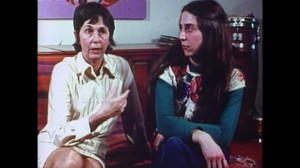Healthcaring is a short documentary that focuses on the historical and contemporary abuses women have suffered at the hands of mostly male practitioners, and depicts solutions women find to lack of access to comprehensive health care in the 1970s.
The film includes many talking heads of women relating their stories of mishaps with mainstream gynecologists and obstetricians, including victim-blaming following a rape, mistreatment during labor, and general misinformation and disrespect. The women’s anecdotes are often short and intense with no interference from an interviewer. This gives the viewer a sense of the popular attitude of women towards mainstream healthcare, especially because there is a wide range of women speaking to the issue in terms of race and age. Interestingly, there is no discussion of abortion rights in the film at all, which may be due to the politics or morals of the filmmakers, or the fact that the Roe v. Wade decision had recently been made by the Supreme Court and there was uncertainty about the effects of the decision in favor of the child-bearer’s right to terminate their pregnancy.
There is also historical context for the systemic mistreatment of women by practitioners that is shown through archival images and acted narration. There is distinct romanticization of eras past when women would care for each other and there was little interference from men in natural female processes such as menstruation and birth. There is little mention of the benefits that modern medicine provided many patients will including antibiotics and effective birth control. But this ties into the main critique of the film that women have been denied genuine access to knowledge about how their bodies work and how to take care of themselves.
The crux of the film’s message rests in the spaces that women have created to nurture self-knowledge concerning preventative care. Though the women who speak about the clinics that they have created with fondness, they directly express their belief that the health care they had to seek out ought to be provided free of charge to every woman in the United States. There is a great sense of the value in maintaining a space for women that includes lively discussion about relevant health issues, promotion of preventative care procedures, and outreach to the communities that the clinics exist.
Ultimately, this film is very frustrating to watch in the beginning of the 21st century because so many of the problems discussed are still endemic in society today. There is still ineffective education about sexual health throughout the United States and shame surrounding feminine sexuality and the bodies of those with vaginas. There are still political attacks on organizations such as Planned Parenthood that provide much needed educational resources, as well as prenatal and STI medical care. It brings to mind the fact that there needs to be more visibility for women’s health clinics, staffed by community members or medical practitioners, as well as the continuing struggle for comprehensively available healthcare overall, with special attention to the needs of women.
“Women and Mental Health: A Feminist Review”

